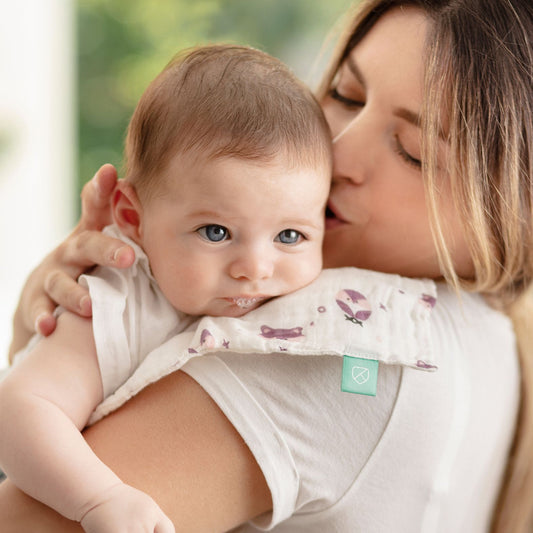Watching your baby grow and develop over the first year is an exciting, yet emotional, experience. Your little one’s getting bigger each day and learning new skills with astonishing speed. But all babies are unique and develop at their own pace! How can we be sure that their growth rate is on track? Read on.
What do we mean by a baby’s “growth”?
The main indicator we use to tell whether an infant is growing on track is, for obvious reasons, weight. But when we talk about ‘baby growth’ we aren’t only referring to weight gain, but also to their height and head circumference.
These physical factors are the first indicators we use to track an infant’s health. The term 'growth', however, is very broad and includes much more, for example motor and cognitive skills which a baby develops during the first few months.
Weight: how much should a newborn gain?
According to WHO growth charts, a newborn baby’s weight can increase by about 400-600g per month in their first three months of life.
Your child’s doctor should be your primary point of reference for your baby's health. We recommend you discuss any concerns you may have about your baby's growth with your child’s doctor or health visitor.
Always bear in mind that not all children grow at the same pace, therefore, try to avoid comparing your baby with other children of the same age.
The most important thing is that your infant puts on weight steadily and doesn’t deviate too much from average growth rates for their age.
You can refer to the World Health Organisation’s charts, which have been devised based on statistical data from different countries around the world.
How much does a newborn grow in a week?
To give you an average reference on weekly weight gain, consider that your baby should gain about 150g per week.
However, this is not a firm benchmark for tracking your baby's growth, as weight gain can fluctuate from week to week. For example, in one week a baby may gain 80g, and the next 200g.
What is really important is that your infant continues to grow from week to week. How much depends on child to child.
How much does a newborn grow in a month?
According to WHO growth charts, during the first three months of life an infant can gain between 400g to 800g per month. From 3 months onwards, their growth rate tends to slow down.
How fast do newborns grow when breastfeeding?
When you start breastfeeding, you may wonder if your baby is getting enough milk. Despite the many signs that can indicate breastfeeding is going well, it’s mathematically impossible to determine the exact amount of milk a baby is ingesting (unlike we are able to do with formula milk).
During the first few months, a baby may suddenly increase their demand for milk, and therefore, the frequency of feeds increases considerably too.
When this occurs, it can initially cause panic for a new mum as she worries her milk is not nutritious enough.
However, these sudden increases in demand for feeding is a physiological behaviour in newborns and serves the purpose of boosting breast milk production to compensate for what are known as baby growth spurts. An infant’s growth doesn’t follow a steady pattern, instead at various stages of their development they experience short, intense sudden bursts of growth – “growth spurts”.
The generally only last a few days and, after which, their feeds resume their normal rhythm.
Length and head circumference
In addition to weight, a baby's head circumference and length must also be tracked.
The average growth in length is about 2.5 cm per month while head circumference is about 1.3 millimetres per month during the first six months.
The average length at birth is approximately 50.5 centimetres in boys and 49.5cm in girls; by twelve months old a baby should reach 70 centimetres (approximately 50 per cent of their birth length).
Psychomotor development in infants
A baby's cognitive development goes hand in hand with their motor development: through play and new movements they acquire cognitive skills.
As with physical growth, psychomotor development varies from child to child. It’s not important that a baby learns to sit, grasp objects or crawl before others, it only matters that they reach their developmental milestones (as long as the gap, when compared to others, is not overly excessive). If you have any concerns about your child's motor and cognitive development, consult your doctor as soon as possible.
What are the psychomotor development stages in infants?
From the very first few weeks, a newborn begins to interact with their surroundings, reacting to people, sounds, colours, and shapes.
At six weeks, they start experimenting with sounds and smiling at mum and dad. They follow brightly coloured objects with their eyes and then later attempt to grasp them with their hands.
At four months, they make cooing sounds and start babbling in response to stimulation, and they become more engaged in play and interact with those around them. Gradually they develop the ability to stand upright on their own and learn to switch positions.
There are many simple and fun games you can use for playtime with your baby, such as rattles and cot musical mobiles, to promote psychomotor development.
"Is my baby growing on track?" and “how much does a newborn grow in the first month” are some of the most frequently asked questions by new mums. Other common questions concern a baby’s sleep: "Why does he wake up every hour? Why does he sleep so little during the day? Why, despite being tired, does he cry when I put him down in his crib to sleep?". Read the article by our baby sleep expert to find all the answers!
The information contained on this Site is purely of an informative nature and does not replace any diagnosis or treatment advice received from a doctor. We recommend that you always seek advice from your family doctor and / or specialists.





